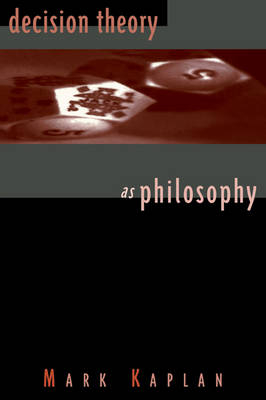
Decision Theory as Philosophy
Seiten
1998
Cambridge University Press (Verlag)
978-0-521-62496-1 (ISBN)
Cambridge University Press (Verlag)
978-0-521-62496-1 (ISBN)
The author presents an accessible new variant on Bayesian decision theory. The book also offers new solutions to some classic paradoxes. It focuses on the intuitive motivations of the Bayesian approach to epistemology and addresses the philosophical worries to which it has given rise.
Is Bayesian decision theory a panacea for many of the problems in epistemology and the philosophy of science, or is it philosophical snake-oil? For years a debate had been waged amongst specialists regarding the import and legitimacy of this body of theory. Mark Kaplan had written the first accessible and non-technical book to address this controversy. Introducing a new variant on Bayesian decision theory the author offers a compelling case that, while no panacea, decision theory does in fact have the most profound consequences for the way in which philosophers think about inquiry, criticism and rational belief. The new variant on Bayesian theory is presented in such a way that a non-specialist will be able to understand it. The book also offers new solutions to some classic paradoxes. It focuses on the intuitive motivations of the Bayesian approach to epistemology and addresses the philosophical worries to which it has given rise.
Is Bayesian decision theory a panacea for many of the problems in epistemology and the philosophy of science, or is it philosophical snake-oil? For years a debate had been waged amongst specialists regarding the import and legitimacy of this body of theory. Mark Kaplan had written the first accessible and non-technical book to address this controversy. Introducing a new variant on Bayesian decision theory the author offers a compelling case that, while no panacea, decision theory does in fact have the most profound consequences for the way in which philosophers think about inquiry, criticism and rational belief. The new variant on Bayesian theory is presented in such a way that a non-specialist will be able to understand it. The book also offers new solutions to some classic paradoxes. It focuses on the intuitive motivations of the Bayesian approach to epistemology and addresses the philosophical worries to which it has given rise.
1. Confidence; 2. Evidence; 3. The Bayesian challenge; 4. Rational belief; 5. The Bayesian Canon; 6. Decision theory as epistemology.
| Erscheint lt. Verlag | 13.1.1998 |
|---|---|
| Zusatzinfo | Worked examples or Exercises |
| Verlagsort | Cambridge |
| Sprache | englisch |
| Maße | 151 x 228 mm |
| Gewicht | 345 g |
| Themenwelt | Geisteswissenschaften ► Philosophie ► Erkenntnistheorie / Wissenschaftstheorie |
| Geisteswissenschaften ► Philosophie ► Logik | |
| ISBN-10 | 0-521-62496-7 / 0521624967 |
| ISBN-13 | 978-0-521-62496-1 / 9780521624961 |
| Zustand | Neuware |
| Haben Sie eine Frage zum Produkt? |
Mehr entdecken
aus dem Bereich
aus dem Bereich
die Grundlegung der modernen Philosophie
Buch | Softcover (2023)
C.H.Beck (Verlag)
CHF 25,20
Buch | Softcover (2023)
Reclam, Philipp (Verlag)
CHF 9,80

![Was heißt Denken?. Vorlesung Wintersemester 1951/52. [Was bedeutet das alles?] - Martin Heidegger](/media/113619842)
